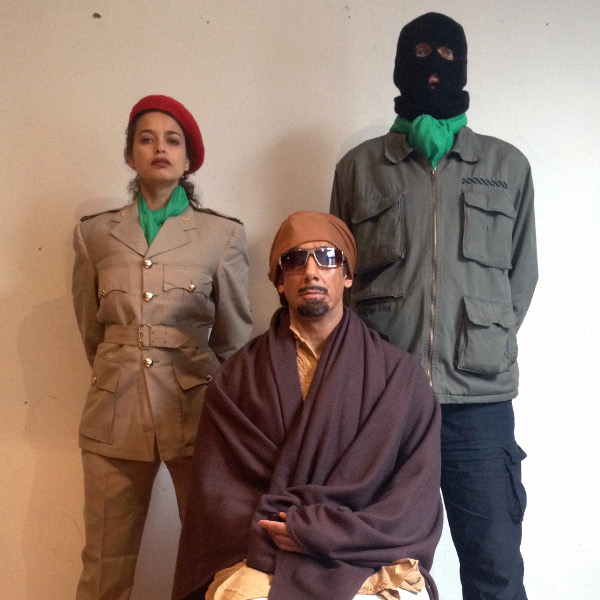An Interview with Gaddafi (Waterloo East Theatre)
This thought-provoking new play explores the global politics behind the downfall of Libya’s Colonel Gaddafi

The Libyan regime change in 2011 ended in one of the most dramatic captures ever recorded, with the defeated Gaddafi being dragged out of a drain begging for mercy before his summary execution.
Reggie Adams‘ play deals with the turbulent political happenings leading up to this climactic event, dramatised around fictitious journalist Bellamy Johan.
Johan is a crumpled, old-school hack whose best days are behind him, at least until his fiery Chilean wife – the excellent Taya de la Cruz – chucks him out with an exhortation to get out there and rekindle his investigative talents. She accuses him of having lost his passion for journalism, but the bottom line seems to be more about cashflow to pay for his daughter’s impossibly expensive American education.
And Bellamy soon discovers a cause to take up, when his Libyan neighbour explains that Gaddafi is being toppled by western interests to stop his plans for an independent African monetary system that would wreck US and European finances. Johan somehow swings an interview with Gaddafi himself, at once reviving his own journalistic career – and putting his life on the line.
There’s a stand-out performance from Walles Hamonde who plays three Libyans, finally donning the famous robes to make a coolly convincing Gaddafi, calmly and plausibly exposing the hypocrisy and greed of the NATO countries who are busy dismantling his state in order to take control of its oil.
Jonathan Hansler brings the right mix of initial weariness and reawakened fire to Johan, and his closing scenes in particular have a genuinely shocking impact.
Andrew Lawden is an entertaining and powerful stage presence as Norwegian businessman Henrik, and whiskey-mad American Joe Steegle, both of whom are quite open about their roles in the cynical takeover of the Libyan economy.
There’s a creative use of filmed footage from video editor Marco Crescini, so we see contemporary TV clips, as well as Bellamy’s giggling, computer-hacking daughters Skyping him. They’re played with charm and humour by Sasha McNally, Emma Lock, Loren Vila, while Jackie Stirling is his irritated editor who snaps at him from the computer screen with suitable bile and ruthlessness – though whether editors ever really exhort their writers to remember they’re part of a ‘mainstream media outlet’ is doubtful.
Reggie Adams is clearly a passionate and committed writer and campaigner. But this is a difficult period to dramatise. Explaining the political spin behind the brutal bombings and western intervention is done largely through long and complicated speeches from the characters, prompted by interview questions from Bellamy. This doesn’t necessarily make for a consistently engaging drama, although it certainly leaves us clear on the author’s view of the Libyan leader’s misrepresentation by the UK’s news media.












